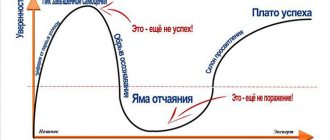Life motivation
A portal about self-development, personal growth and a positive attitude towards life
Searching for information on the portal
- home
- Personal development
- Self-knowledge
The Pygmalion effect or the Rosenthal effect is a psychological phenomenon, the essence of which is that a person, at the subconscious level, builds a line of behavior based on the opinions and expectations of others.
We often, without realizing it, encounter the Pygmalion effect in life. The most striking example of this is children with deviant behavior. Nothing good is expected from them. Subconsciously, the attitude towards such children is appropriate. As a result, they live up to the expectations of others.
Another phenomenon speaks about the Pygmalion effect: when we are convinced of something, we everywhere find confirmation that we are right. For example, a manager is biased towards one of his subordinates. And, despite all his services to the company, the boss will look for flaws in his work, and will subconsciously justify the failures of other employees.
The Pygmalion effect is also called a self-fulfilling prophecy. The expected comes true. What is this connected with? There is an assumption that the brain filters incoming information in one way or another and concentrates attention according to the received settings.
- The history of the Pygmalion effect
- The Pygmalion effect and research in psychology Robert Rosenthal's first experiment - “rat motivation”
- Robert Rosenthal's second experiment - "Excellent Students"
- Testing the Pygmalion Effect in the Israel Defense Forces
- Key points of this phenomenon according to Rosenthal
What is the Pygmalion effect?
The Pygmalion effect is a psychological phenomenon according to which a person unconsciously predetermines the outcome of a situation by his expectations regarding a given situation. In a broader sense, this phenomenon is called a “self-fulfilling prophecy.” This phenomenon is observed in all sciences and spheres of human activity, since people tend to adjust their behavior in accordance with their own and others’ expectations.
The meaning of the psychological phenomenon under consideration is that a person’s expectations (positive or negative) are most likely justified. The Pygmalion (or Rosenthal) effect does not imply mystical relationships, since the person himself involuntarily makes efforts in the right direction. He believes that he knows the outcome, so he prepares for it and takes actions that seem logical to him.
Typically this effect involves the following chain of events:
- A person gains confidence in a certain outcome.
- Unconsciously, he carries out actions that bring him closer.
- He perceives the behavior and reactions of others differently.
- Thanks to his actions, expectations are met.
- The person says to himself: “Everything turned out as I thought!”
In most cases, the Pygmalion effect is a typical self-fulfilling prophecy. Initially, such a prophecy is far from reality. But people begin to act in accordance with their own expectations, as a result of which it comes true. It is important to understand that the actors themselves are not aware of their own influence on the situation. It seems to them that the prophecy has come true on its own.
Why cognitive distortions are good
Cognitive biases may seem like a bad thing because they cause us to deceive ourselves and make irrational decisions. But in fact, thinking errors serve several important functions.
Firstly, they help cope with information overload - we simply physically cannot process all the information from the outside.
Secondly, they help save time - to analyze everything that happens around us, it would take us hours, if not days, and cognitive distortions simply give us a pre-prepared algorithm of actions.
Thinking errors can be a salvation in a stressful situation, when our logic turns off and we seem to begin to act on pure instincts.
In addition, cognitive distortions are part of our psychological defense, making the world understandable and fair, and we can continue to believe that everything will be fine with us if we behave as the situation requires.
How does the Pygmalion effect manifest itself?
In real life, this phenomenon is often associated with mystical expectations. For example, a fortune teller tells a guy that he will soon meet his destiny. And so he, anticipating the long-awaited meeting, begins to take more careful care of himself. He dresses better, shaves diligently and behaves more refined. He also smiles warmly at every stranger he likes, looking into her eyes with interest. And thanks to this behavior, he soon actually meets a nice girl.
Interestingly, the Pygmalion effect is often found among scientists who are not at all inclined to believe in mystical relationships. It can occur in any science, at all stages of an experiment that people can influence. Even if a direct influence on the phenomenon under study is impossible, it directly depends on people how the data obtained will be interpreted or systematized, what parallels and relationships will be identified when processing the results.
This effect is very pronounced in children. A child who is regularly praised for his academic achievements gains self-confidence and learns better. If you convince him that he is an incapable student, then from now on his grades will be appropriate. Moreover, already in childhood it is possible to “program” a person’s fate, convincing him that a great future awaits him or that, on the contrary, he will grow up to be a loser.
Completion
Believe in yourself, your talent and you will succeed! And finally, I would like to recommend that you familiarize yourself with another interesting phenomenon in psychology – the placebo effect. It is a little similar to the one described today, as it shows how easy it is to convince a person of something. Knowing the secrets of such phenomena, as well as introducing them into everyday life, can significantly increase its quality. At the very least, getting what you want will become easier and faster.
By the way, if you want to train your brain, the scab effect will help with this. Read the article, I think you will like it.
The material was prepared by psychologist, Gestalt therapist, Alina Zhuravina
Read further:
How to achieve great results using the “presence effect”?
Why does labor productivity increase if the Hawthorne effect is present?
Cobra effect: I wanted the best - it turned out as always
Veblen consumer effect: why do we spend so much money?
Where does the deja vu effect come from: is it a gift or a curse?
How did the term come about?
The Pygmalion effect was discovered by the American psychologist Robert Rosenthal (which is why in the professional literature it is usually called the Rosenthal effect). The discoverer himself named the discovered phenomenon in honor of the famous mythical character.
According to myth, the brilliant sculptor Pygmalion from the island of Crete once carved an ivory statue so beautiful that he himself fell in love with it. He dressed her in luxurious clothes and gave her expensive gifts. Seeing such love, Aphrodite revived the statue, who became the sculptor’s wife and bore him three children.
This beautiful ancient Greek myth symbolizes the power of faith and persistent desire. Therefore, it was in honor of the fictional sculptor that Rosenthal named the phenomenon he discovered.
The most notable are two experiments confirming the existence of the Rosenthal effect. Let's take a closer look at them.
First experiment – “Pygmalion in the classroom”
The first of the famous experiments was carried out by the discoverer himself, together with Lenore Jacobson in 1965, to demonstrate what the Pygmalion effect is in practice. The results of the work were published in 1968 under the title “Pygmalion in the Classroom.”
The experiment was conducted among high school students in San Francisco. The children took an IQ test and some of them randomly overestimated. Teachers were surprised by such indicators, since the selected students showed very mediocre academic progress. Psychologists responded that the children had not yet proven themselves, but would soon demonstrate their true potential.
When the scientists came to the school at the end of the year, it turned out that the experiment participants they had selected were now the best students in the class. After re-testing, they found that the IQ of the “selected” students had increased significantly. Thus, Rosenthal and Jacobson demonstrated how much student success depends on how much teachers believe in their abilities.
Subsequently, based on this study, a program was proposed to stimulate the development of children using similar methods. But it turned out to be unsuccessful, since it was impossible to provide the necessary conditions. The fact is that in the original study, the decisive factor was the conviction of the teachers themselves that the children chosen by psychologists were gifted.
Second experiment - “Programmed sympathy”
In 1986, Rebecca Curtis and Kim Miller published the results of another study that explains well what the Pygmalion effect is. Its participants were students who initially did not know each other. They were randomly paired up and had to just hang out for a while. At the same time, some randomly selected participants were “warned” that their interlocutor liked them. Others were told that the interlocutor had antipathy towards them.
The results of the experiment were predictable. Students who were initially confident that their interlocutor already liked them communicated more affably and perceived their partner positively. They were more outspoken, diligently looking for common interests and views. But the most interesting thing is that the confidence of one person led to the fact that the second (who did not receive any “warnings” at all) after the conversation really felt strong sympathy for him.
Block 1. Expectations. Definition.
Expectation is a constructed internal mental plan in the form of a scenario of future events, to one degree or another comparable with conditional objective reality.
Expectation is closely related to attitude. Expectations of events are directed to the future and are associated with the following factors from the past:
- There have been similar events in the past.
- There are reasons for the development of such events.
- There is a source for such events.
- Such events did not exist in the past, but they can be simulated taking into account the logic of the processes.
Expectations include answers to the following questions:
- What events will happen?
- Under what conditions can this happen?
- In what order will this happen?
- When will this happen?
- Who will this happen to?
- What elements will these events consist of?
- Where will this happen?
- What is the connection between the events?
Expectations are the building of a cause-and-effect relationship between a chain of events. At the same time, expectations also provide for “miracles” when the chain is disconnected somewhere, because it is not understood by the subject, and the occurrence of the desired event, despite this, is expected. And these are human illusions, but more on that later.
Practical meaning
The Rosenthal effect is not just a psychological phenomenon of interest to researchers. It influences the life of almost every person. Most often you may encounter the following manifestations:
- Self-esteem and success
. People suffering from low self-esteem experience serious difficulties with career growth. It is more difficult for them to arrange their personal life and make good friends. They themselves believe that they are not worthy of success in life. And those around you feel it, reacting accordingly. Inflated self-esteem acts in the opposite way. A self-confident person moves up the career ladder faster, effortlessly becomes the “life of the party” and enjoys success with the opposite sex. - The importance of attitude in medicine
. The attitude of the doctor and the patient plays a big role in the treatment process. If both are initially committed to a positive outcome, the likelihood of its occurrence increases significantly. But a negative attitude may well lead to the opposite effect. That is why doctors always strive to convince the patient and his relatives of a favorable outcome of any treatment. - Teacher's attitude and student's success
. If a teacher initially treats a student with disdain, this significantly reduces the student’s performance. At school, this attitude on the part of teachers also leads to problems with the behavior of children. Usually a child is inclined to believe adults, so he accepts the image of a slacker and a hooligan imposed on him. Thanks to this effect, students who are initially liked by teachers demonstrate higher academic success and diligent behavior.
With a good understanding of what the Pygmalion effect is and how it works, you will be able to notice many more of its manifestations in real life. Thus, the successes of subordinates often depend on the expectations of their superiors, and parents largely determine the fate of their own children, convincing them at an early age that they are talented (or, conversely, untalented). Perhaps you yourself have encountered a situation where you were able to do something incredibly difficult only thanks to 100% confidence in success.
Situations from life
The Pygmalion (Rosenthal) effect can occur in many life situations. It is talked about in cases where a person has low self-esteem. Such individuals do not easily achieve career growth and often remain unhappy in their personal lives.
Quite often this phenomenon is encountered in pedagogy. Students who, for certain reasons, are disliked by teachers and accused of all sorts of violations, tend to have low academic performance and not follow the rules of discipline. Such students subconsciously take on the negative image attributed to them. In contrast, the so-called favorites can boast of good grades and no complaints about their behavior.
Another area that allows us to observe manifestations of the Pygmalion effect is medicine. If there is mutual respect and constructive dialogue between the doctor and the patient, the results of therapy are most often positive and lead to recovery. Doctors who are irritated and dismissive towards their patients have an undesirable effect on their general condition. The natural result of this is a deterioration in the vital signs of patients and a prolonged course of the existing disease.











